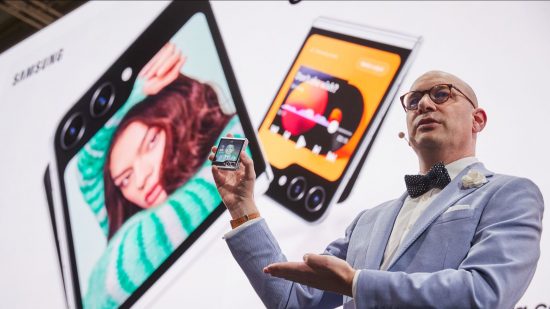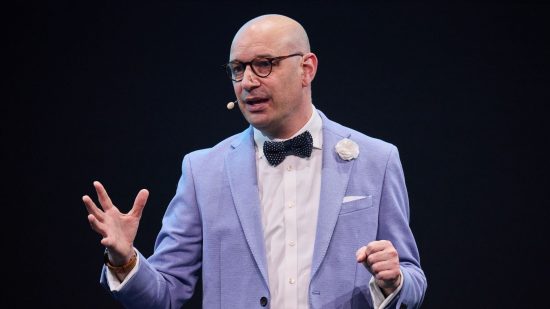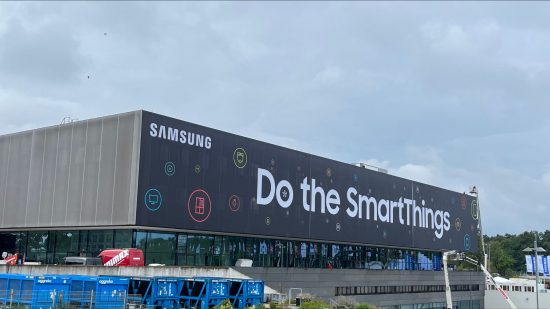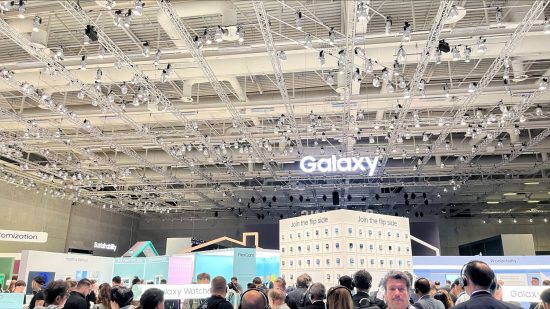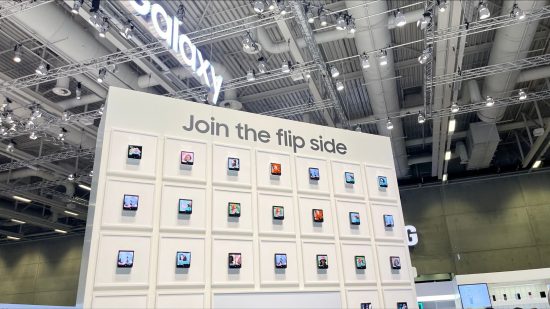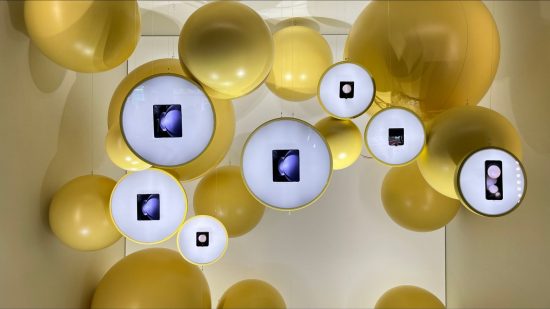In February this year, I had dinner at the same table as Benjamin Braun, Chief Marketing Officer for Samsung Europe. He mentioned something about folks who go for walks three times a day, once after every meal. Since then, I’ve taken a walk after every meal too. All this goes to say; he makes an impression.
So, when I got the opportunity to chat with him at IFA 2023 in Berlin, I wanted to jump at the chance. But there was one issue: Samsung wasn’t talking about gaming at IFA. The company’s push at this event was Smart Things, a catch-all for its wide range of appliances and smart devices that fit into your home. Now, we’re not TechRadar… we’re not about to review a clever doorbell. So, just as Smart Things is a broad umbrella for various devices, my questions stay broad. Of course, I hoped to push in certain, specific directions, though that didn’t go quite as well…
The main thing I’m interested in is how Samsung plans its ecosystem integration. There’s the Apple route, which is ‘we make a small handful of things, let’s make sure they work so closely together that no one would ever be able to leave our ecosystem without a concerted effort.’ Then there’s the Huawei (and others) route, which is ‘we make so many different things and whether they have clever compatibility or not isn’t our focus right now’. On paper, Samsung sits in the latter camp, but it sort of sounds like it’s trying to do both.
“We just finished some research in Europe. 67% of the people we spoke to said that they want their next device, their next appliance to be internet connected to be part of the connected home”, Braun told me. “So, from next year, 100% of our products, all of our products will be Wi-Fi enabled, because then we can give you and all the customers more service, more than just the physical product that you bought from us.”
So, how does this actually help? “I’ll give you a couple of examples from my personal life. I have the Samsung washing machine at home. When it’s finished, it gives me an alert on my watch, on my phone, on the TV, or the Samsung refrigerator, depending on where I am. And so I know that the cycle has come to an end and I can go and hang the things up because, as you probably know, if you forget to hang the things up, the smell isn’t great. And all that becomes wrinkled, right.”
Braun continues, “another thing that I like in my Samsung washing machine is that I pour literally litres of detergent into it, and then it automatically doses it depending on how much is actually needed. And when it starts running low, it automatically orders more detergent for me that gets delivered. So it’s one less thing that I have to worry about because we’ve automated for you.” Whether it’s a camera in an oven with AI to stop you from burning your chicken, or a notification that you need to clean your washing machine’s filter, interconnectivity is key here.
Interconnectivity is also the headline with the biggest launch for Samsung at IFA 2023, a new app called Samsung Food. It has around 160,000 recipes in it, and you can use a camera in your clever fridge to take a peek at what you may be missing while you’re at the shops. Better yet, if you get caught in traffic on the way back from the shops, you can send the recipe to your clever oven and it starts heating up to the right temperature and settings. With everything in your house interconnected, you never have to think about anything ever again, it seems.

While doing the ‘SmartThings’ is all well and good, it does raise a pretty key issue: the environment. With the Apple event recently confirming carbon neutral products from the company, and smaller companies like Fairphone making waves – one of our best of IFA 2023 picks – the guilty environmental conscience of the tech industry is clearly a big issue. And it doesn’t feel massively eco-friendly to replace everything in my home with Samsung stuff so my phone can tell me what’s going on.
Of course, Samsung has been pushing for more eco-friendly products for a while now. Back at MWC in Barcelona, I learned all about how fishing nets are repurposed for small aspects of the company’s handsets. I also learned about solar-powered TV remotes. There are dozens of little things, from auto-brightness on Samsung televisions to clever washing-machine AI that can tell how dirty your clothes are and reduce washing time accordingly. One of the more interesting aspects is the changes made to one of the products we all use every day.
“Think back about your home in London,” he says to me, “how many different chargers that you have plugged in for all of your different devices. And even if you’re not charging anything, there’s still a ghost draw on those charges. Now, if you think about that, at a global scale, all of our different plugged-in chargers, that’s a massive ghost draw, an unnecessary draw. So our R&D team are working on these solutions that almost use zero electricity when you’re not charging. And if you think about the future, those technologies are going to be really important. We need to eradicate ghost draw.”
And I guess that’s the encouraging thing coming out of Samsung right now, that it seems to be looking at a very wide range of solutions to ecological problems. And I wonder, with the idea of armageddon on our minds, whether AI is something worrying Benjamin. AI in a washing machine to scan your clothes is unlikely to cause you harm, but after the last few months and years of AI development, it feels like it should be a big worry for any leader in the tech space.
Well, as far as I can tell, he doesn’t seem too worried. His main concern is Samsung users’ privacy. For example, he said, “this data is Ben’s data and you have to give permission for that data to be used by someone else or by another company. So we’ve built Knox security into our phones. So when you use your phone, and you download apps, you have to give it permission to use your microphone, or your video camera, or your location. And you can decide, you decide, it’s not down to the app developer to decide, you have [to] decide, right, so we’ve given you the control.”
Braun goes on to explain that “we’ve now also put Knox security onto our TVs. Because what you watch on your TV at home? That’s yours. And you can decide if you want to share that with advertisers and others in the future. But whether it is our use of AI or generative AI or machine learning, the data belongs to you and not security as part of that.”
This all sounds like stuff the biggest Android phone manufacturer should be doing, of course, and it doesn’t really delve at all into the ideas around AI integration into personal computing. And that does worry me slightly, though the Chief Marketing Officer, of course, is not leading the AI R&D charge, so maybe I knocked on the wrong door with this one.
Knocking on the wrong door seemed to become a habit for me after this. I really want to know what’s going on with Exynos versus Samsung’s partnership with Qualcomm of late. The reason I want to know is because I don’t fully have my head round it all. I want someone to help me understand everything, and well, that didn’t happen here, to say the least. So, Exynos versus Qualcomm…
“I prefer eating my chips with mayonnaise,” Benjamin replied. Now, I think I must have looked about as baffled as humanly possible at this point because, somehow, in spite of having my head buried in tech 24/7, I didn’t get the joke. “Okay”, I replied, a baffled look still firmly slapped on my face, so much so that I think Benjamin realized he’d have to help me out a bit.
“That’s my comment. But maybe next time when we sit down we can talk through, because that’s actually an interesting question. So maybe next time we sit down we can explore a little bit more about the lesser-known parts of Samsung. Heat Pumps is a lesser-known part. Our memory business is a lesser-known part. But also our chip businesses are less than mobile. So maybe next time we can go through that in a little bit more detail. But I do like my chips with mayonnaise rather than ketchup. What about you?”
“Oh, really in the Belgian way,” I say.
“Frites,” Benjamin replies
“Yeah. Ketchup, I don’t really like.” (And I can’t believe anyone does).
Then Benjamin lets slip a pretty outrageous chip-based dislike in reply; “And I do live in London. I don’t want to upset too many British people, but the vinegar on fries.” Crikey, guess the interview is over…
Well, no, as we had more to chat about: Samsung DeX and the Frame TV and Disney partnerships and blah blah blah, though the most interesting thing we talked about wasn’t actually Samsung, thanks to a very simple question. What’s your favorite non-Samsung product right now?
“So I’m a bit of a geek, I’m a massive nerd. To be honest, I get excited about tech. I find the artificial intelligence that we already have in cars, I’m not talking about autonomous driving, I’m talking about the AI we already have in cars, that will save so many lives. If someone in front of you in traffic slams the brakes, you won’t have time to detect that as fast as the AI in your car will. It will tighten your seatbelt. automatically try to avoid it by changing lanes or slamming the brakes, it will start blinking the brake lights in the back to alert other people linking them to alert them.”
There’s more beyond driving tech alone, of course, recently made more of a big deal by a certain Cupertino company. “If you are in an accident, you end up upside down in a ditch somewhere and you cannot reach your phone,” Braun says, “the phone will automatically call emergency services and tell them you’ve been in an accident, you’re incapacitated, and tell them where you are. I spent 10 years as a special police constable for the Metro Police. I can’t tell you how many times, how many times we’ve had calls where there’s been an accident. And we don’t know where it is.”
That wonderful health tech that feels like such a driving force in the industry is a really good answer to any question, really. With crash detection and satellite SOS, tech is getting far better at looking after us. It can stop us dying right after an accident, or help protect us in the long-term, with things like sleep tracking. Samsung’s Watch 6 sleep tracking gives you a little animal that represents your sleep quality, which is cute.
“What’s your sleep animal?” I ask Benjamin.
“So I can tell you on my watch, right now, I have a lion, which is not great. I only slept six hours and four minutes, which is about an hour and a half more than yesterday.”
“That’s pretty good for IFA”, I say. I’d also take the lion over the penguin any day, but that’s by the by.
All this goes to show, really, is that Samsung’s integration into a person’s life can extend far further and will continue to do so. The idea of a smart home isn’t just a doorbell with a camera in it and some Phillips Hue lights. It’s far greater than that. But, fundamentally, what Samsung makes that gets us excited, is still a central feature of that. The smartphone controls the smarthome, and not the other way around.
So, while we’re waiting for the Samsung S24 Ultra and fawning over titanium at the top end, it’s a nice reminder that Samsung isn’t Apple. It isn’t Xiaomi. It’s its own thing. And whether you want that thing washing your clothes and cooking your meals is up to you. Either way, they’re trying their best to be appealing to you. And they’re on the right track from what I can tell. Cute animals can sell anything, eh?
